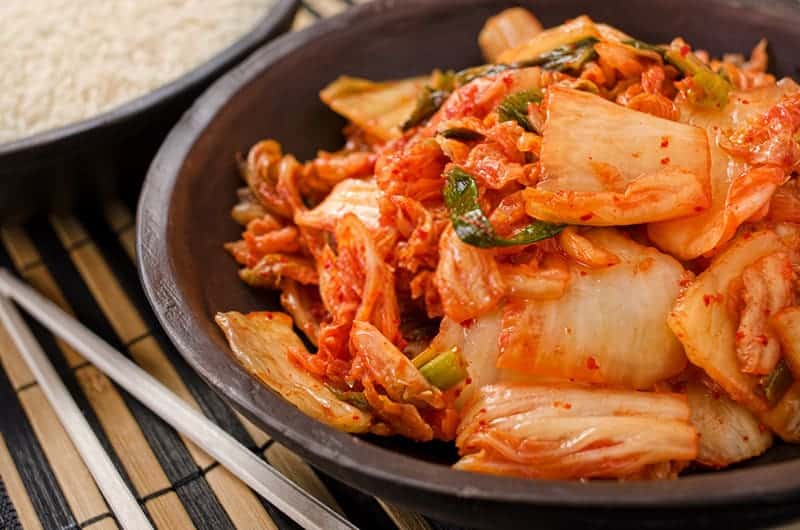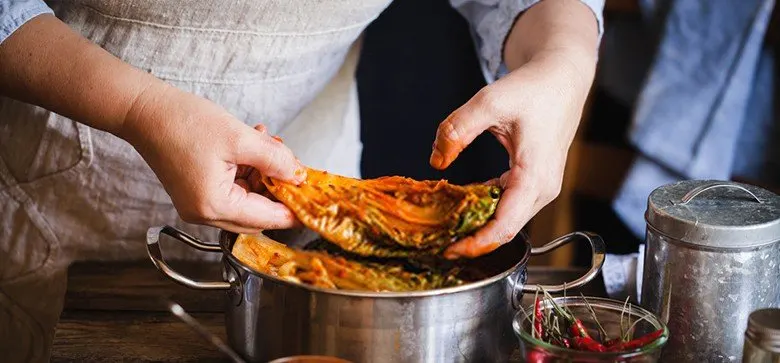Ever wondered what the Koreans find so fascinating about Kimchi that they seem to never get enough of it?
In fact, Kimchi is probably one of the fundamental elements that have become synonymous with Korean tradition.
Aesthetically, Kimchi does not seem too appetizing, do they? (Unless you’re a hardcore vegan).
However, just the fact it plays such a central role in any Korean cuisine makes it a more intriguing subject of conversation.
For a simple food recipe that has gained the kind of preposterous popularity it has gained over the years, one cannot help but wonder, what does Kimchi taste like?
What is Kimchi?

Before proceeding to analyze how it tastes like, it is first crucial to understand what Kimchi actually is in its raw form.
In the most fundamental definition – kimchi is a traditional side dish made of fermented vegetables.
Kimchi can be made from a plethora of vegetables that we use almost every day.
However, the most common type of Kimchi that most western people are familiar with is the fermented cabbage version.
A thick paste is made from a mixture of Korean red pepper flakes, 2 tablespoon water, and sugar.
The paste recipe has several variations depending on one person to another.
The paste is then mixed with other chopped vegetables such as carrots, Korean radish, and green onion.
It is then applied uniformly throughout the cabbage and kept for at least about a week.
What Does Kimchi Taste Like? Does Kimchi Taste Good?

For someone who has never tasted kimchi, the taste can be quite “intriguing,” especially for those people who are not familiar with “fermented” food products.
Kimchi has a distinctly sour taste primarily due to the fermentation process.
However, the sourness isn’t too overwhelming. The taste of Kimchi also includes a fair hint of umami and spice.
The “genuine” taste of Kimchi can have dynamic possibilities varying from one maker to another.
The amount of spice used or the duration of fermentation plays a key role in establishing its ultimate taste.
Due to such a varying range of taste possibilities, it is difficult to compare Kimchi’s taste with other conventional food products.
However, the distinct sourness will tend to dominate the taste chart of Kimchi irrespective of what method or recipe you decide to use.
Another one of the key reasons why Koreans use Kimchi as a core side dish is due to its various nutritional values.
Kimchi is an excellent source of carbs (55%), protein (17%) and fats (27%) mainly because it is largely comprised of vegetables.
It has a very low percentage of calories (1%) as well.
Kimchi also plays a vital role in aiding the digestive system of our body, mainly because of the use of “Lactobacillus” bacteria during the fermentation process.
What Are the Uses of Kimchi?

Koreans traditionally use Kimchi as one of the core side dishes with almost every single food cuisines.
Two of the best ways you can use Kimchi is with cooked rice and noodles.
However, there are other abundant ways you can incorporate Kimchi with your food recipes.
Due to its distinct combination of sour and peppery-taste, Kimchi can be used in various dishes with moderate spice level to obtain a balanced flavor.
Some of the common recipes where you can use Kimchi are –
- Scrambled eggs
- Tacos
- Fried rice
- Quesadilla, etc.
There are also some basic preventive measures you should keep in mind while making or using Kimchi with your other food recipes.
- Use Kimchi only in small amounts to your recipes as their distinct sour taste can become too overwhelming.
- Know how much of fermentation your kimchi needs. The longer you keep your Kimchi, the sourer it becomes, and it also loses the crunchy texture. It is important to keep that in mind when using Kimchi with your other food recipes.
Conclusion
Kimchi is one of the most unique dishes you will ever come across. It is not like your typical deep-fried or simple cooked/boiled food products.
It has a distinct smell and taste as well and can be incorporated with a vast number of your everyday food recipes.
Not to forget its plethora of nutritional benefits. Head out to your nearest Korean market or even try making one yourself.

What Does Kimchi Taste Like? Does Kimchi Taste Good?
Ingredients
- Kimchi
- Ingredients from your favorite recipes
Instructions
- Depending on the recipes you choose, the taste can vastly differ.
- For authentic results, it is important to choose a recipe that will highlight the original flavor.
- Have fun experimenting with different recipes and taste tests!
